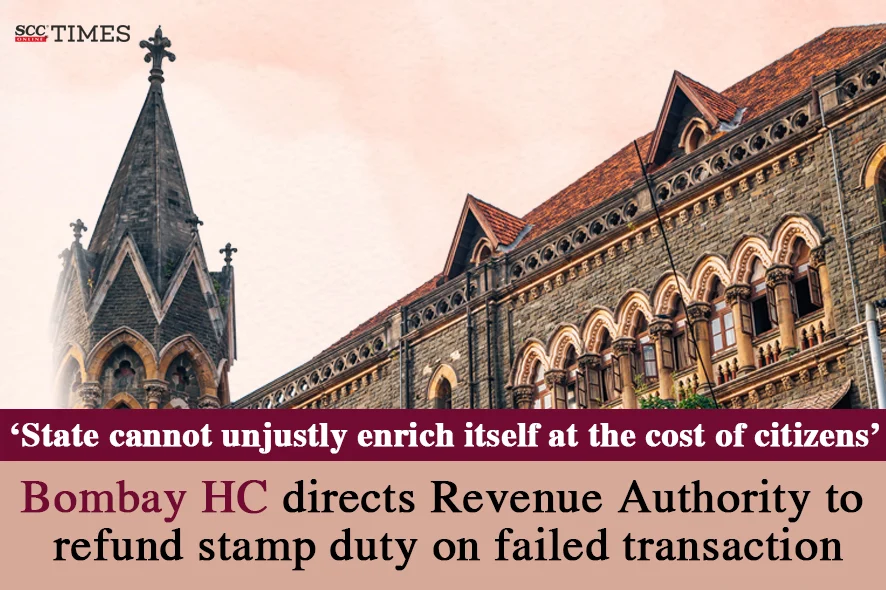Bombay High Court: In a writ petition filed for the refund of the stamp duty paid by the petitioner , as the transaction got shelved, the Single Judge Bench of Milind N. Jadhav, J., allowed the writ directing the Revenue Authority refund the Stamp Duty amount of Rs.17,50,000 and Rs.42,50,000 to the petitioner along with the interest of 4% within two weeks. The Court held that State could not unjustly enrich itself at the cost of its citizens. Failure of the transaction once shown and proven in this case entitled the petitioner to refund of stamp duty paid once the transfer failed as per the provisions of Maharashtra Stamp Act, 1958 (‘Act’).
Background
The petitioner Company, proposed to enter Deed of Transfer as a purchaser with the Transferors for transfer of flat admeasuring 2000 sq.ft. in Ashok Nagar Co-operative Housing Society Ltd., Mumbai for total consideration of Rs.3.50 crores.
In another transaction, the purchaser proposed to enter second Deed of Transfer with same transferors with respect to Plot No. 13 in the same building for a consideration of Rs. 8,50,00,000. Both aforesaid Deeds of Transfer were undated but were duly signed by parties. On 14-10-2010 the purchaser paid Stamp Duty of Rs.17,50,000 and Rs.42,50,000 respectively on the above two Deeds of Transfer.
However, owing to disputes and differences between parties, transfers did not fructify and both unregistered Deeds of Transfer failed its intended purpose. Neither consideration of the amount of Rs.3.50 crores was exchanged nor there was any transfer or handing over of possession of said flats and land.
Consequently, the purchaser filed two applications for refund of Stamp Duty paid by it on the two Deeds of Transfer and further submitted an affidavit-cum-indemnity bond in lieu of execution of a formal Cancellation Deed, to the Collector.
The Collector rejected both applications for refund under Section 52A(2) of the Stamp Act on the ground that the purchaser failed to furnish a duly executed Deed of Cancellation. Thus, the purchaser filed two appeals before the Revenue Authority under Section 53(1A) of the Act. The Revenue Authority dismissed the appeal on the ground that they were not maintainable as the order sought to be challenged had been passed by the same Authority in its administrative capacity and was thus barred by Section 52A(3) of the said Act.
Aggrieved by the same, the petitioner approached the present Court.
Analysis, Law and Decision
The Court noted that the proposed Deeds of Transfer though executed by the parties were undated and unregistered. No consideration was paid by the petitioner to the transferor and the possession of properties remained with the transferor itself. Therefore, the transaction never fructified. Hence, the Court stated that the instant case fell within the ambit of Section 47(c)(5) of the said Act.
It was further noted that the petitioner produced all relevant documents including the three affidavits of its directors and affidavit-cum-indemnity bond which clarified that the Deed of Cancellation could not be executed due to non-cooperation of the transferor. Thus, the Court opined that these documents sufficiently safeguarded the revenue and served the same purpose as a formal Deed of Cancellation.
The Court observed that the Revenue Authority took a hyper technical view for the rejection of the applications. It was emphasised by the Court that Section 47(c)(5) of the Act was enacted specifically to prevent the unjust enrichment of the State when a transaction fails at inception.
Furthermore, the Court observed that the filing an appeal before the same Authority which had passed the original rejection order defeated the object of providing an Appellate remedy and offended the principle of “Nemo judex in causa sua”. Such procedure adopted was contrary to fairness in adjudication and rendered the order as unsustainable.
Based on the abovementioned observations the Court opined that Affidavits of Directors of the Company were adequate substitutes for the Deed of Cancellation in the event where the Transferor was reluctant to execute the same. Petitioner had paid the stamp duty in good faith with the prospect and hope of fructifying the transaction, but the transaction got shelved. Thus, petitioner could not be put to loss and the State cannot unjustly enrich itself for no fault of the petitioner.
Accordingly, the Court directed to refund the stamp duty amount of Rs.17,50,000 and Rs.42,50,000 to the petitioner along with simple interest at the rate of 4% from the date of Application for refund within a period of 4 weeks from the date of the judgment. The Court held that State could not unjustly enrich itself at the cost of its citizens. Failure of the transaction once shown and proven in this case entitled the petitioner to refund of stamp duty paid once the transfer failed.
[Qwick Supply Chain Pvt Ltd v. LAO, 2025 SCC OnLine Bom 3074, decided on: 3-9-2025]
Advocates who appeared in this case:
Advocate for the Petitioners- Vikramaditya Deshmukh, Ketan Dave, Gaurav Gangal i/by A.S. Dayal & Associates, Advocates
Advocate for the Respondents- Aloka Nadkarni, AGP


